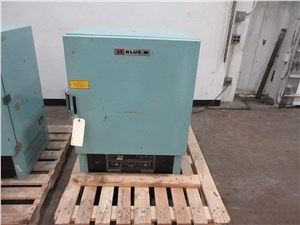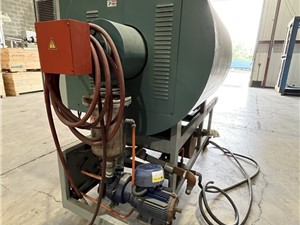Ovens are integral to various plastic processing stages, performing crucial tasks like annealing, drying, curing, thermoforming, and residue removal. These appliances enable precise heating and temperature control, ensuring durability, structural integrity, and functionality of plastic components.
Annealing Ovens heat thermoplastics below their glass transition temperature (Tg) to relieve internal stresses. By doing so, they improve ductility and prevent cracks in components, ensuring the material’s structural integrity.
Curing Ovens are vital for thermoset plastics. They facilitate the chemical crosslinking process, solidifying these materials and enhancing their durability and stability.
Drying Ovens eliminate moisture in plastic materials. This step is crucial for preventing warping, cracking, or defects during subsequent processing stages, such as thermoforming.
Thermoforming Ovens heat plastic sheets to pliable temperatures, allowing them to be molded into specific shapes via vacuum or pressure forming. This stage is essential for manufacturing containers, packaging, and other molded plastics.
Burn-off Ovens remove plastic residues from molds, dies, and tools. By providing controlled, high-temperature conditions, these ovens ensure equipment is clean and ready for reuse.
Convection Ovens use heated air circulation to ensure uniform temperature distribution. Convection ovens are ideal for annealing, curing, and drying, where consistent heating is crucial.
Infrared Ovens apply infrared radiation to heat plastics directly. They offer faster heating times and greater energy efficiency compared to conventional convection ovens, particularly for processes like thermoforming.
Burn-off Ovens Specialize in cleaning tools and molds, burn-off ovens remove residues through combustion. Advanced models include features like top-down heating and automatic cycle controls.
Pyrolysis Ovens break down organic material (like plastic waste) into smaller molecules under high heat and controlled conditions without oxygen, making them suitable for recycling and cleanup.
Drying Ovens effectively remove moisture from plastics, ensuring optimal conditions for the next processing phase.
Flashing Ovens are used to soften thermoplastics quickly, enabling instant processing in production lines.
Melting Ovens heat plastics to their melting points for reshaping or bonding processes. Softening ovens, on the other hand, heat materials until pliable, which is particularly useful in thermoforming applications.
Pro Tip: When selecting an oven for plastic processing, consider the following: Ensure the oven can maintain the required temperature range with high uniformity, ensuring consistent results. Verify that the oven offers cycle times, dwell times, and cooldown times suitable for your specific application. Select an oven appropriate for the size and type of plastic parts being processed. Prioritize ovens with safety features like overheat alarms, automatic shutdowns, and insulated exteriors.
Industry-Leading Brands in Ovens for Plastics
INTEK Corporation
Known for precision temperature control and customizable oven solutions, INTEK designs highly versatile models suited to various plastic-processing applications.
Gruenberg
Gruenberg specializes in standard and custom industrial cabinet ovens, catering to curing, drying, and heat-processing needs for plastics.
Despatch Industries
Offering a diverse range of batch ovens, including walk-in and clean-process models, Despatch Industries is a reliable choice for high-demand industrial and laboratory environments.
Trimac Systems
Trimac Systems excels in gas catalytic, electric infrared, and convection ovens designed specifically for industrial-scale needs.
Blue M Ovens
Blue M Ovens combines durability with advanced features, making them ideal for precision plastic-processing tasks like annealing and curing.



.JPG)
.jpg)
___(1).jpg)
